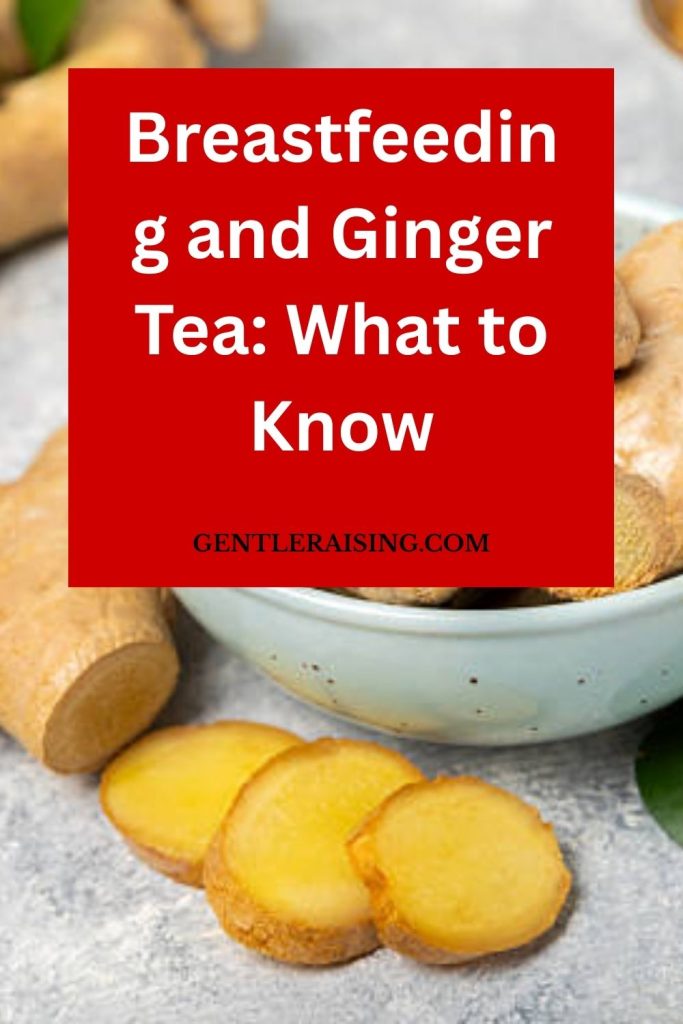Let’s get one thing straight right from the start: breastfeeding is not just feeding. It’s healing. It’s bonding. It’s survival, nourishment, and love, all rolled into a quiet act repeated multiple times a day and often at the weirdest hours. And when you’re deep in that phase, even the tiniest choice about what you eat or drink feels huge. Cue ginger.
Ginger, zesty, warming, and surprisingly polarising, tends to spark curiosity among new moms. Can I take it? Will it affect my baby? Does it boost milk supply or dry it up? Wait, can I even drink ginger tea?
Let’s walk through all of it without the jargon, without the fear-mongering. Just real talk, backed by facts and guided by a little common sense and a lot of mom-wisdom.
Wait, is ginger even safe when you’re breastfeeding?
Short answer: Yes, in moderation. Long answer: Well, let’s unpack it a bit.
Ginger (Zingiber officinale, if you’re feeling fancy) is a root that’s been used in traditional medicine for thousands of years, from easing nausea in pregnancy to fighting off colds, cramps, and even sluggish digestion. But once the baby’s out and you’re nursing, things shift a little. Suddenly, it’s not just about you anymore. It’s about your milk. And your baby.
Most studies, though limited, suggest that ginger is generally considered safe during breastfeeding when used in food amounts or as mild teas. That ginger shot you love from your favourite juice bar? Probably fine now and then. A ginger-heavy supplement with 1,000mg+ doses? Maybe not the best idea without checking with your healthcare provider.
The (very real) benefits of ginger while breastfeeding
Okay, now for the good stuff. Because ginger isn’t just safe, it actually brings a few welcome perks to the postpartum party:
1. Eases postpartum nausea and bloating
Still feeling a little queasy or gassy weeks after delivery? Yep, totally normal. Your hormones are doing their wild dance, your digestion is recalibrating, and your organs are literally reshuffling themselves. Ginger’s anti-inflammatory and carminative properties (read: gas-relieving magic) can really help here.
2. Helps with inflammation and pain
If you had a C-section or experienced perineal tearing, you know pain management is a thing. Ginger’s been shown to have mild analgesic effects, especially helpful for reducing muscle pain or general inflammation. A cup of ginger tea might not replace your painkillers, but it could take the edge off.
3. May support milk supply
This one’s a bit fuzzy. Some small studies and anecdotal evidence suggest ginger could help increase milk production, possibly by boosting blood circulation and stimulating oxytocin (the same hormone that lets your milk flow). But again, don’t bank on it as a magic fix. It might help, it might not. Still worth a shot if you’re struggling.
4. Boosts immunity
Sleep-deprived? Stressed out? Touching a lot of baby things that’ve been, uh, everywhere? Ginger’s antimicrobial and immune-boosting properties may help keep you from catching every passing cold.
5. Supports digestion (because constipation is real)
Many new moms battle sluggish digestion. Whether it’s from postpartum meds, stress, dehydration, or the trauma of labour (yes, trauma, let’s call it what it is), ginger can help speed things up gently.
Can ginger ever mess with your milk or your baby?
Here’s where things get a little nuanced.
Ginger has a blood-thinning effect in large quantities. That’s important if you’re still recovering from childbirth or on any medications that affect clotting. Also, because ginger can stimulate the digestive system, too much of it could (very rarely) irritate your baby’s tummy via your milk.
What’s “too much”? There’s no hard line, but most experts agree that up to 1 gram of dried ginger or 2 grams of fresh ginger per day is a safe threshold while breastfeeding. That translates to:
- 1-2 cups of homemade ginger tea
- A few slices of raw or cooked ginger in food
- Occasional ginger candies or lozenges
In short, your daily chai? Totally fine. A week-long ginger cleanse? Maybe… no.
Ginger tea, cookies, soup, what form is best?
Honestly? Whatever feels good.
Some moms swear by steeping fresh ginger in hot water with a drizzle of honey and a squeeze of lemon. Others lean into ginger-laced soups, stir-fries, or broths (especially comforting if you’re still in your soft-food postpartum phase).
Store-bought teas? Most are mild enough to be safe, but always check the label. Some blends sneak in additional herbs that may not be breastfeeding-friendly (looking at you, liquorice root and peppermint).
Ginger cookies or crystallised ginger? They’re more snack than supplement, but still bring a little ginger goodness plus emotional comfort. And let’s be real: sometimes that counts more.
How to tell if your baby is reacting to ginger
Every baby is different. While it’s rare for ginger to cause a reaction through breast milk, it’s not impossible. Keep an eye out for:
- Fussiness or irritability after nursing
- Diarrhoea or unusual poop patterns
- Rashes or skin irritation
- Excessive gas or spitting up
If any of that crops up consistently after you’ve had ginger, try removing it from your diet for a few days and observe. Still happening? Probably not the ginger. If things improve? You may want to cut back or avoid it for now.
Real moms, real experiences
Asha, mom of two in Nairobi, shared, “I added ginger to my soups almost every evening, and it helped me feel warm and grounded. I didn’t notice any changes in milk, but my digestion was definitely better.”
Riley, a first-time mom in Texas, said, “I tried those breastfeeding teas with ginger and fennel, el loved the taste, not sure they did anything for supply, but they made me feel cared for. And that mattered too.”
What about ginger supplements or capsules?
Here’s the tricky part. Supplements are concentrated, and they’re often not regulated the same way food is. If you’re considering ginger pills or high-dose capsules, it’s best to talk to a healthcare provider first.
Why? Because those mega-doses can sometimes interfere with medications, worsen bleeding risks, or cause heartburn. Plus, you don’t really need that much ginger to get the benefits.
Bottom line: Ginger’s your friend (with boundaries)
Ginger during breastfeeding? Yes, absolutely, as long as you’re keeping it moderate, paying attention to how your body and your baby respond, and checking with a professional if you’re unsure.
A warm ginger tea on a rainy afternoon. A slice of ginger in your chicken soup. Even that chewy ginger candy at 3 a.m. while rocking your baby back to sleep.
It’s not just about the root. It’s about the ritual. And if that little spicy kick makes you feel stronger, calmer, and a tiny bit more you in the chaos of motherhood? That’s more than worth it.
P.S. If you’re dealing with serious issues like low milk supply, digestive problems, or postpartum pain, ginger can help, but it shouldn’t replace medical advice. Always loop in your doctor, midwife, or lactation consultant.
And hey, you’re doing amazing. Keep going.

